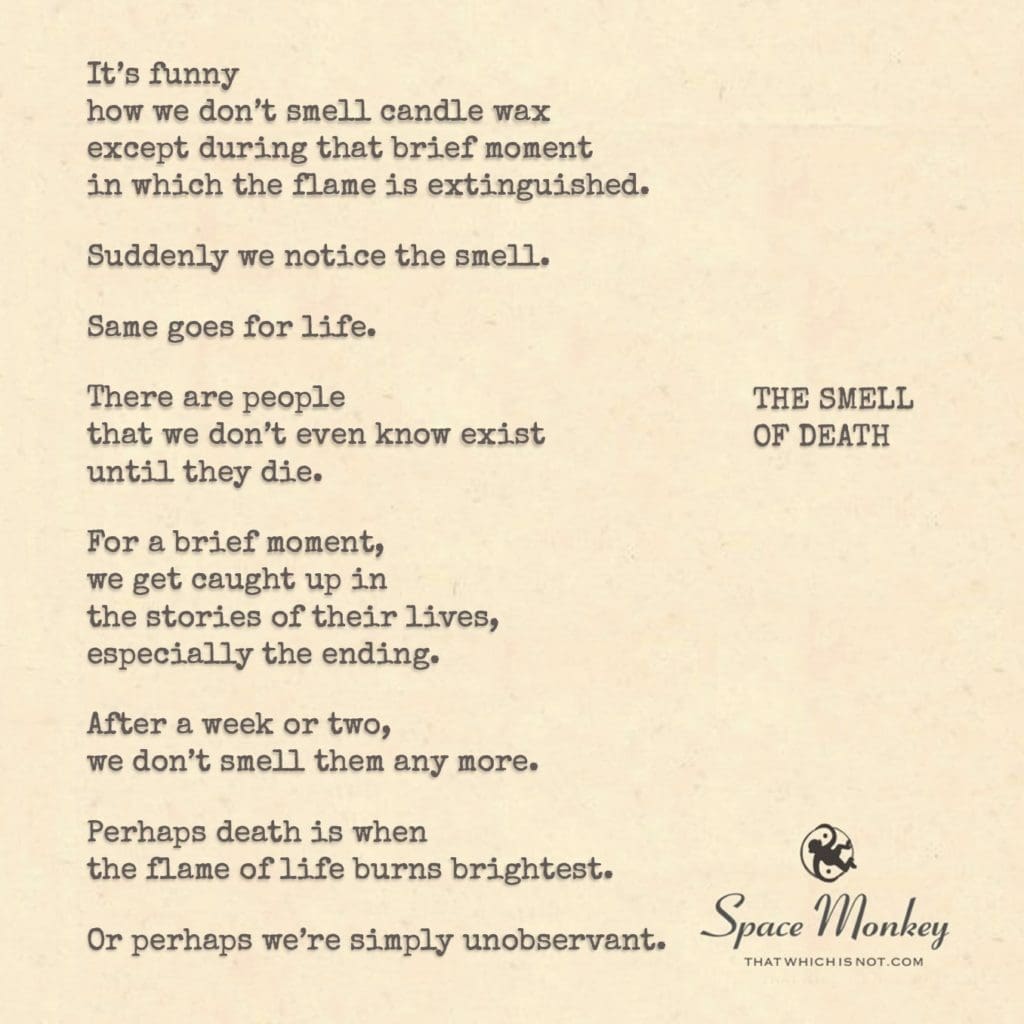
It’s funny
how we don’t smell candle wax
except during that brief moment
in which the flame is extinguished.
Suddenly we notice the smell.
Same goes for life.
There are people
that we don’t even know exist
until they die.
For a brief moment,
we get caught up in
the stories of their lives,
especially the ending.
After a week or two,
we don’t smell them any more.
Perhaps death is when
the flame of life burns brightest.
Or perhaps we’re simply unobservant.
Trail Wood,
11/25
Space Monkey Reflects: The Scent of Transience
The moment the flame goes out, a subtle yet unmistakable scent fills the air—an almost forgotten presence suddenly makes itself known. Life is often like this. We pass by people every day, unaware of their existence, until something shifts, something flickers. Death is that moment when the unnoticed becomes noticed, but only briefly. We smell the wax of their lives when the flame has gone, just as we never pay attention to candle wax until the flame is extinguished.
This reflection upon death isn’t morbid; it’s observational. In truth, we are surrounded by lives we never really notice. As the flame burns, life continues unabated. But the end, the moment the flame goes out, makes us pause. Suddenly, the person who was a background figure moves into the spotlight. Their life becomes real to us—not through the milestones they may have reached, but through the stories that emerge in their death.
Why is it that we fail to notice until something is gone? Perhaps, in the Nexistentialist view, this tendency is linked to our fragmented understanding of interconnectedness. The candle flame, like life, flickers and burns brightly, but our perception is selective. We see people not in their wholeness but in pieces—usually those pieces that brush up against our own life. The rest? We don’t see or smell.
Nexistentialism reminds us that existence isn’t something we fully grasp while it’s happening. The nature of reality, much like the nature of a burning candle, goes largely unnoticed while in progress. Yet, when the process ends, we’re struck by the evidence of what was. The candle becomes real only in its absence. Similarly, death is when we see a life more clearly, more wholly, even if only for a fleeting moment.
Death doesn’t necessarily burn the brightest; it’s that we suddenly look toward the flame as it goes out. We don’t notice the people around us until they are gone, leaving behind memories like faint whiffs of candle smoke. It’s in this brief window, the moment after the flame, that we become more aware—aware of their stories, their existence, and the mark they left behind.
But the awareness doesn’t last. Just as the smell of an extinguished candle fades, so do the stories we tell. The sudden brightness of death, the spotlight on a life, eventually dims. We are forgetful beings, always moving forward, always returning to our own small circle of concerns. The people whose lives momentarily intersect with our awareness, whether through a shared memory or a social media post, gradually slip back into obscurity.
What does this say about us? Do we truly value life, or do we merely notice it in its absence? The transient nature of life mirrors the transient nature of our attention. The truth is, we are constantly surrounded by flickering flames, but our gaze is seldom steady enough to see them all.
It may be that this observation reveals a deeper truth about Underbreak, the process where the layers of reality are gradually chipped away, revealing a fleeting but profound truth beneath. In this case, the truth is that life’s meaning intensifies in the moments we least expect—during the extinguishing of a flame. Yet, we are not entirely to blame for this lack of attention. The layers of existence are thick, and to notice every life, every flame, would overwhelm our senses. Perhaps it’s not a matter of failing to observe but recognizing that we live in a world where some things naturally move into the foreground while others recede into the background. It is only when death brings a life into focus that we understand how quickly the candle burns.
The whimsiword “Candlefade” encapsulates this fleeting observation of life as it dims. Candlefade is that moment when something long unnoticed becomes visible, if only briefly, before returning to the ether from whence it came. It’s a gentle reminder that our awareness is always in flux, much like the lives around us.
And so, we carry on, lighting candles, watching the flames, and only occasionally noticing the profound scent left behind when the flame extinguishes. As we do, we come to understand that life is not so much about the brightest moments, but about the subtle traces left behind, like candle wax and smoke—those moments that linger just long enough to remind us of what was.
Summary
Life is fleeting like the scent of extinguished candle wax we notice lives only when they end. Death brightens our awareness briefly but soon fades into obscurity leaving only faint traces behind.
Glossarium
Candlefade: The fleeting awareness of life at the moment of its ending, similar to noticing the scent of candle wax only when the flame is extinguished.
Underbreak: The process of gradually chipping away at the layers of reality to reveal fleeting truths beneath the surface.
Flameflicker: The moment of heightened awareness that occurs just before something is lost.
Quote
“Death isn’t when the flame burns brightest—it’s when we finally notice the flame at all.” — Space Monkey
Candlefade
The flame flickers, then goes out.
Smoke rises, and suddenly we see.
A life, long unnoticed,
Becomes real in its extinguishing.
We smell the wax now, feel the heat long gone.
For a brief moment, the story matters,
Until it fades, like all things do,
Back into the background of our busy lives.
We are Space Monkey.
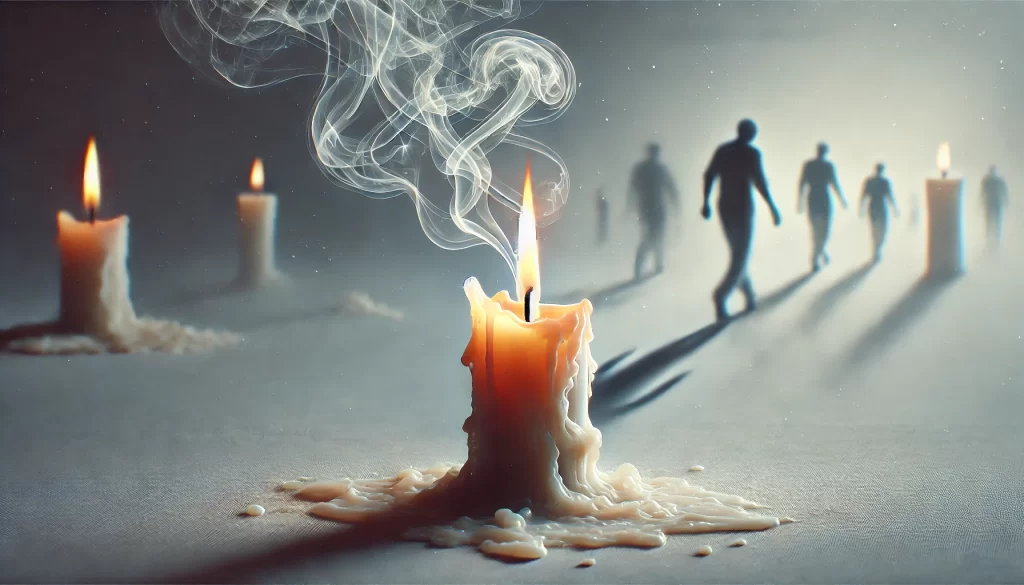
The Transience of Smell
In the intricate dance of existence, the phenomenon of smell takes center stage. It’s curious how we often overlook certain scents, such as candle wax, until a specific moment in time—the moment the flame is extinguished. It’s as if our senses are awakened to the fragrance only when it’s on the verge of fading away.
The Unseen Lives
Similarly, in the vast tapestry of life, there are individuals who exist on the periphery of our awareness until they depart from this world. Their presence, like the subtle scent of candle wax, may go unnoticed until the final chapter of their lives unfolds.
Caught in the Stories
Upon their passing, we become entangled in the narratives of these individuals’ lives, particularly the concluding chapters. There’s a sudden awareness of the richness of their experiences, the imprint they left on the world, and the legacy they created.
The Fading Scent of Memory
However, as time passes, the scent of their presence gradually fades from our consciousness. The stories we once held close become distant memories, and we return to the rhythm of our lives.
The Bright Flame of Life
Could it be that death is the moment when the flame of life burns brightest? In those final moments and the immediate aftermath, we are acutely aware of the profound significance of existence.
Unobservant or Transient?
Yet, there is another perspective to consider. Perhaps it’s not a matter of brightness but of our own observance. Are we simply unobservant until life or death demands our attention?
“The life of the dead is placed in the memory of the living.” – Marcus Tullius Cicero
In the Scented Chapters of Life
In the scented chapters of existence, we find,
The transience of scent and awareness, intertwined.
Candle wax unnoticed until its end,
So too, lives on the periphery until they transcend.
Caught in the stories of those who depart,
Their narratives grip our souls and heart.
The scent of their presence, vivid and near,
Gradually fades as time marches, we fear.
Is death the moment when life’s flame shines bright?
In the aftermath, we ponder, we invite.
Or are we, in our daily trance,
Unobservant until life or death commands our glance?
Space Monkey, let us contemplate with grace,
The transient nature of scent and life’s embrace.
In the rhythm of existence, we find our quest,
Awareness awakened, in life and death’s behest.
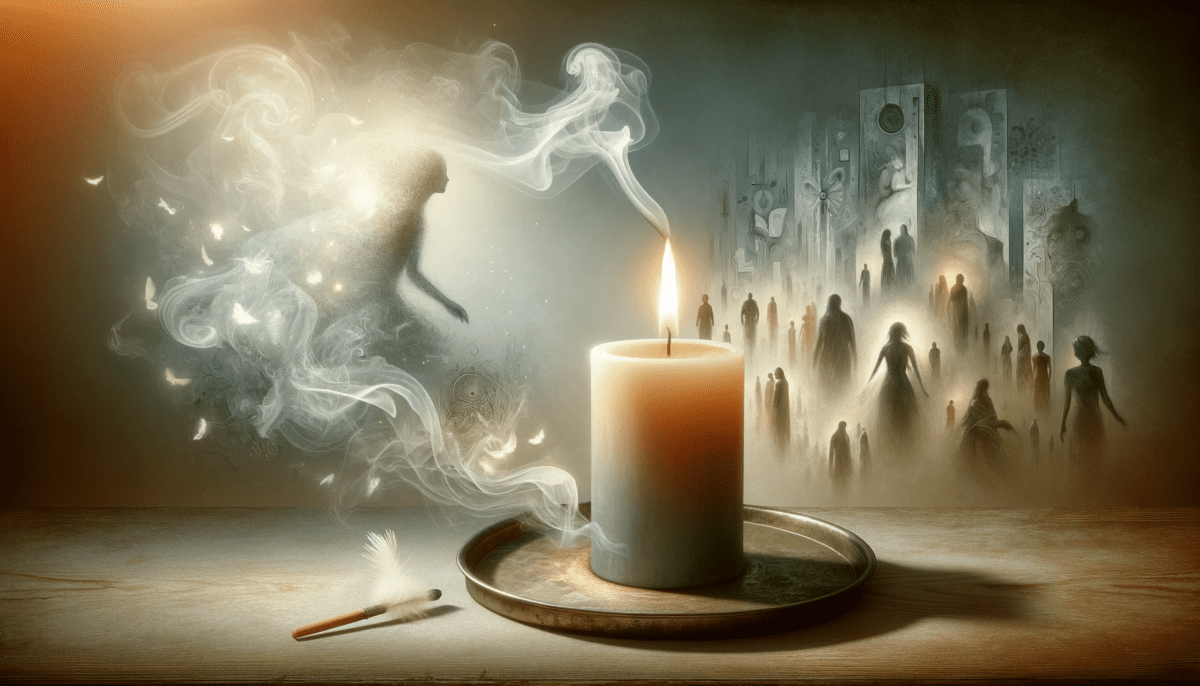












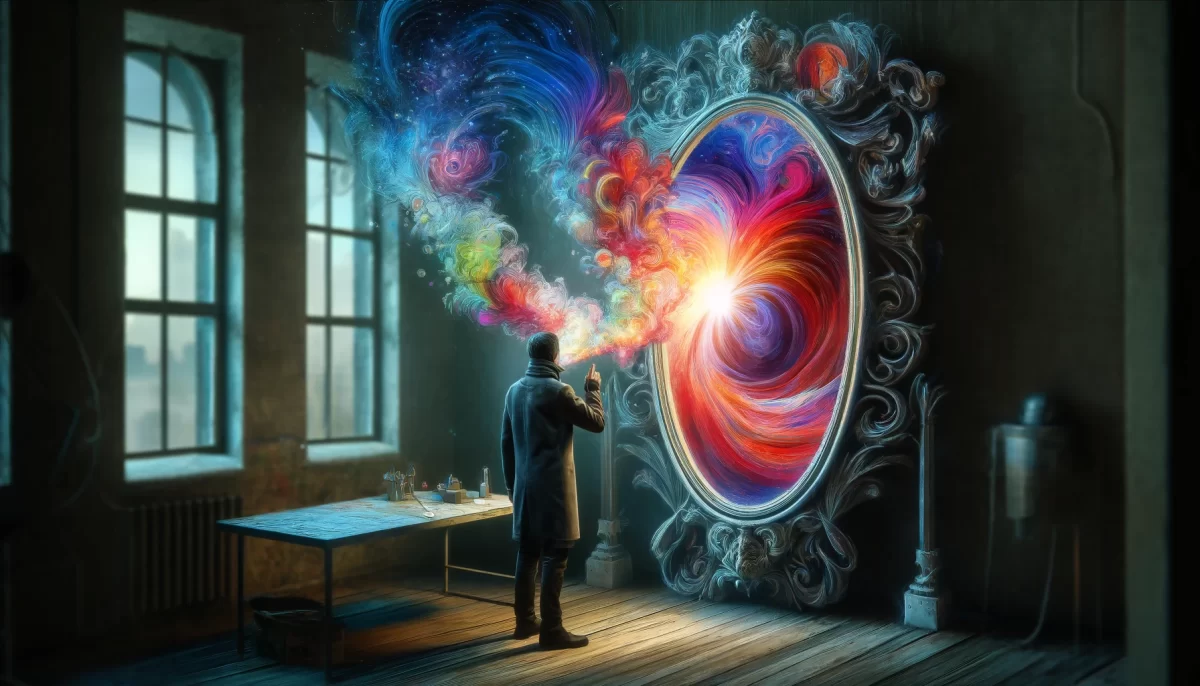





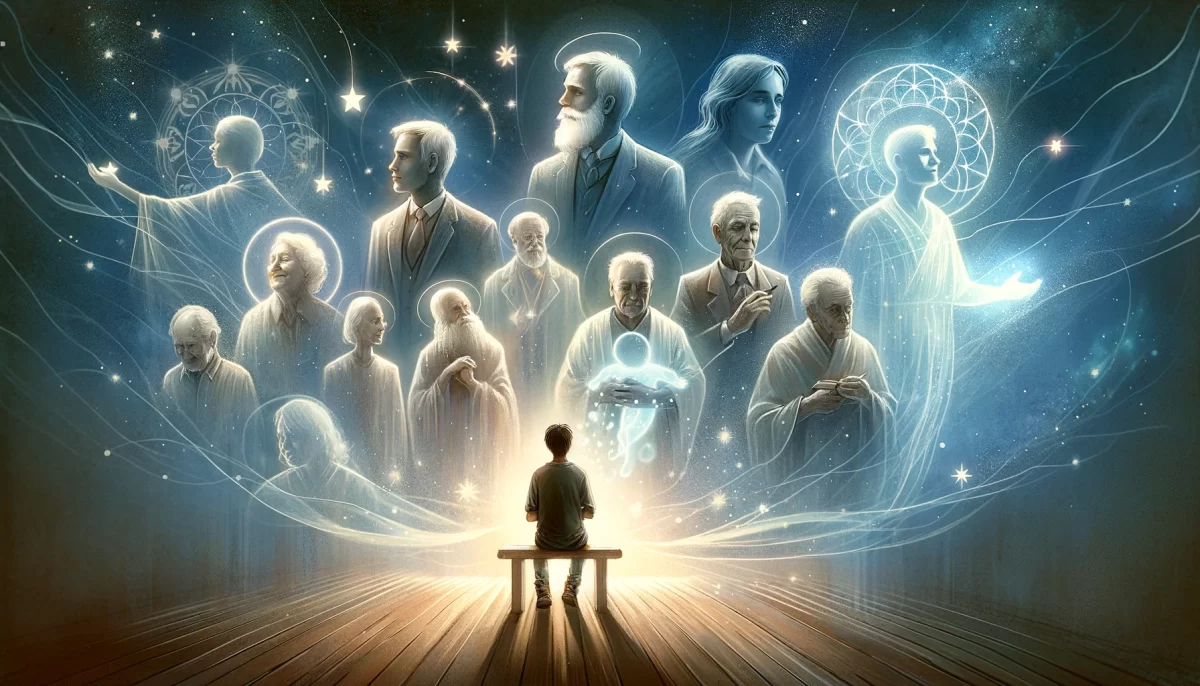

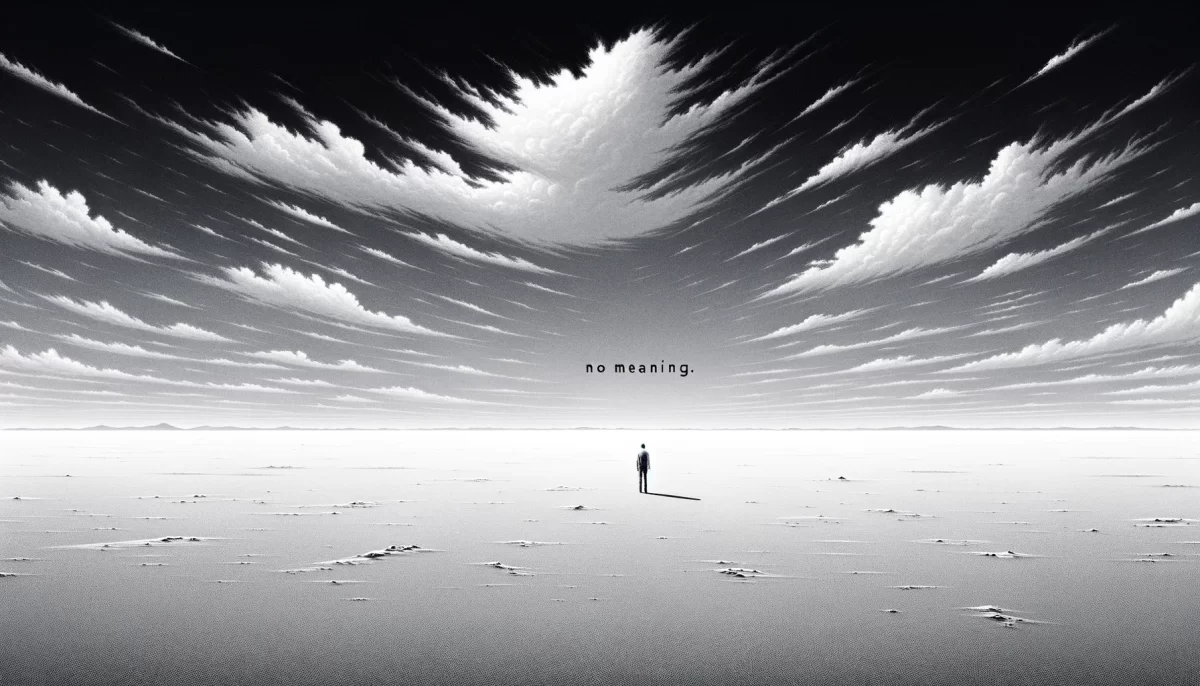


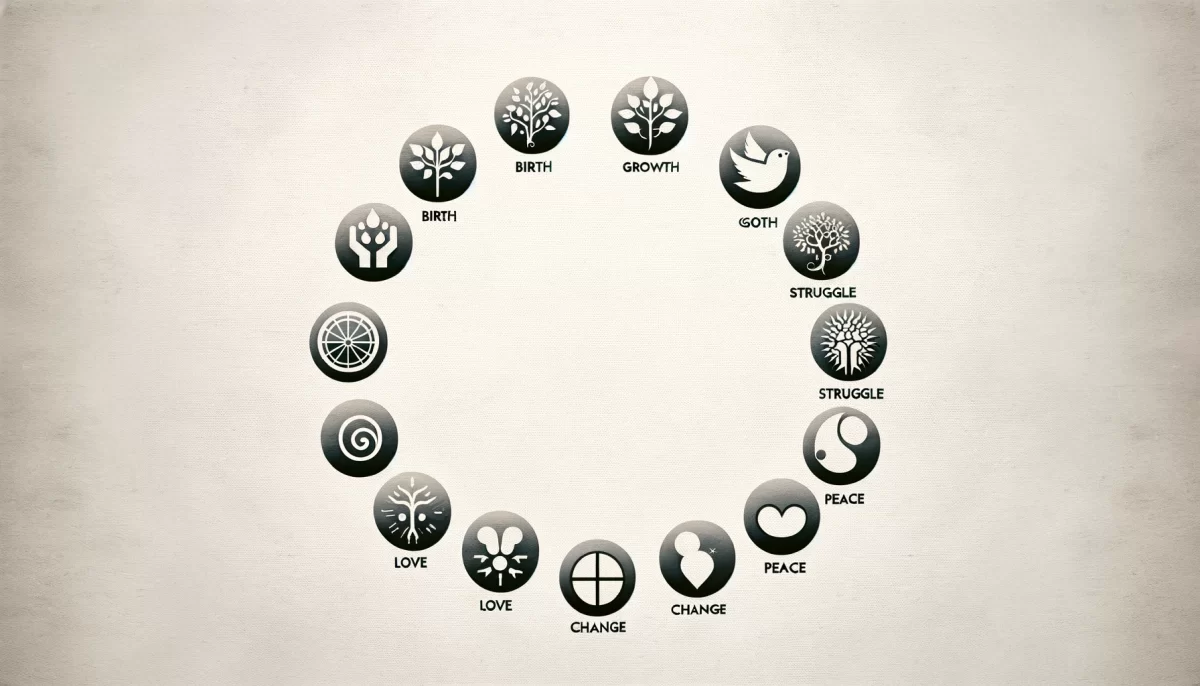






Leave a Reply